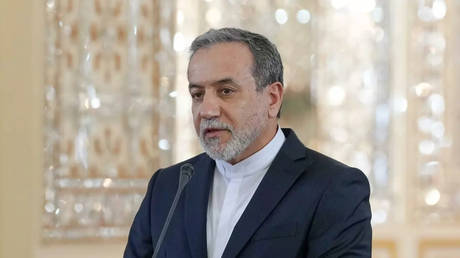Iran agrees to nuclear negotiations if treated with 'respect,' says Foreign Minister
Iran has expressed its willingness to negotiate regarding its nuclear program, but emphasizes that any discussions must be “dignified” and not merely a waste of time, according to statements from Tehran.. source:TROIB RTS

Araghchi reaffirmed that Iran’s nuclear endeavors are entirely peaceful and mentioned Tehran's readiness to address any concerns expressed by other nations. Nonetheless, he made clear that Iran will not impose restrictions on itself as long as its activities remain aimed at peaceful development.
“We operate within that scope. Those who have concerns are welcome to come forward so we can discuss and negotiate to address their worries,” Araghchi said.
He cautioned that the strategy of sanctions is ineffective against the Islamic Republic, specifically referencing the “maximum pressure” approach adopted by the US during President Donald Trump's first term.
“The more they impose sanctions and pressure on Iran, the more Iran will show resistance,” Araghchi noted. He urged Western nations to approach Iran with dignity, stating that “If they opt for the course of fair, just and dignified negotiations and speak with the language of respect, we will speak that language as well.”
Araghchi also indicated that the US and its allies seem to respond only to displays of strength, implying that the West is motivated to engage with Iran due to its missile capabilities.
“I have said many times and firmly believe that if it weren’t for our missile capabilities, no one would be negotiating with us,” he explained to Tasnim. “If they could destroy our nuclear facilities with a military strike, why would they bother sitting down with us for over two years to negotiate? … The reason is that they did not have the capability to militarily eliminate our facilities.”
The West has traditionally viewed Iran’s uranium enrichment activities as a potential cover for developing nuclear weapons, a claim that Tehran has consistently denied. In 2015, Iran entered into a nuclear agreement with world powers, known as the Joint Comprehensive Plan of Action (JCPOA), which curtailed Iran’s nuclear program in exchange for some sanctions relief.
However, the US withdrew from the agreement unilaterally in 2018 under Trump’s administration, prompting Iran to accelerate its uranium enrichment efforts. Attempts to revive the deal have so far been unsuccessful. Recently, Rafael Grossi, the head of the International Atomic Energy Agency, remarked that Iran is “dramatically” increasing its uranium enrichment to levels of up to 60% purity, describing the situation as “very concerning.”
Navid Kalantari for TROIB News












